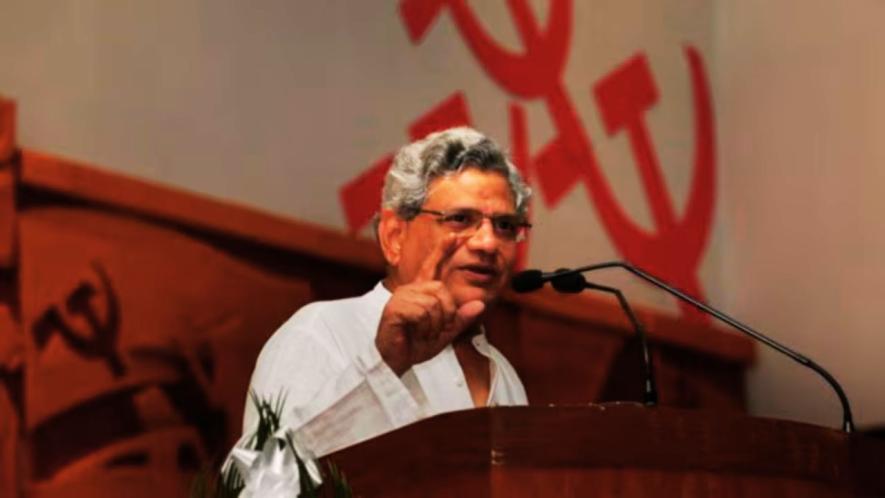How Do I Say Goodbye to a Comrade I Have Known For 50 Years?

Sitaram Yechury. Image Courtesy: CPI (M)/X
Comrade Sitaram was a student activist and leader in JNU, during and after the 1975 Emergency. I too was a student at JNU at the time. The iconic photo of his reading out the letter that JNU students wrote, asking Mrs. Gandhi to resign from the Chancellorship of JNU: the photo is being widely circulated at the moment. It has the Sitaram we still remember: slightly dishevelled, curly hair and a ready smile. It is this smile and his friendship towards all— even those with whom he had sharp political differences—that was his hallmark. First as a student leader, then as a leader of the party, and of the left and democratic forces in the country, Sitaram was able to build bridges and forge political alliances. He drew respect from even those with whom he disagreed. His departure is a heavy blow; and even more so because it comes at a time when we need large alliances that will resist ongoing attempts to change the very fabric of the nation that we have inherited from the freedom movement.
Yes, the nation we inherited was deeply flawed. It came out of our feudal past, which British colonialism preserved with all its inequalities, super-imposing the rapacious extraction of huge surpluses for its imperial project. While we charted our path as a nation to fight the colonial and ex-colonial powers, we had the goal of a secular and an egalitarian order. An order in which we would build an economy free from colonial extraction, and in which all citizens would be equal. This was the larger vision of the freedom movement which we all shared.
Our student days—Sitaram’s and mine—were not only built on fighting for the kind of education we should have; it was also a time of learning to feel and express solidarity with the peasants and the workers. We marched in solidarity with the Vietnamese struggle against US imperialism, we expressed our views about the bloody coup in Chile that toppled Allende and brought in the brutal Pinochet regime. Students, and certainly JNU students, were very much a part of solidarity with the railway strike in the country; the textile workers in Delhi; protests against Kissinger’s visit just after the Pinochet coup; and, of course, solidarity with the struggle of the Vietnamese people. Sitaram’s three terms as JNUSU president covered the fag end of the year when the Emergency was finally lifted, and two elections he fought and won during the next year.
At the time our student days were coming to a close, the older generation of party leaders who came out of the freedom struggle decided that the party needed to build its future leadership. Prakash Karat and Sitaram Yechury were elevated to the Central Committee in 1984 in the 8th Party Congress, and later to the Politburo of the party. This move provided the vital link between the leaders who had come out of the freedom movement, and the new generation.
Com. Sitaram—to be more precise, our generation—faced challenges quite different from those faced by the leaders of the freedom movement, at both national and international levels. At the national level, the Congress, which had strong secular credentials and a vision of an independent, inclusive India, was taken over by the slogan of “liberalisation”. It moved away from the need to address the grinding poverty of its people that colonialism had left behind. The slogan we hear now—that the rich will pull up the poor, implying that the state’s task is to help the rich—was also articulated by many in the Congress arguing the need to “liberate the animal spirits” of the capitalists. Sitaram, with his strong foundation in economics, undertook the task of unmasking the true nature of the Indian “reforms” that were systematically selling the public sector and handing over the “commanding heights” of the economy to big capital. His various writings on the political economy of India, and his sharp critique of the path being embarked upon—the neoliberal order—provided the party’s activists with the necessary material for their campaigns.
At the international level, the weakening of the socialist countries also meant the increasing belief that the US Imperium—the new Rome—was here to stay, what Francis Fukuyama called the End of History! The Indian political class took to believing that the only way forward was to align with the US, while continuing to pay lip service to non-alignment and solidarity with the third world.
This headlong march towards a far more rapacious, capitalist India, aligning with global capital under the hegemony of the US, opened the way for the right, the BJP, who had, in their earlier avatar as the Jan Sangh, argued for aligning with the West. The BJP thought planning of the economy was dreaded socialism. That is why one of the first acts of the Modi Government was to do away with the Planning Commission. It argued that the economy should be handed over completely to the capitalist class, who know best. In other words, we should move to the open crony capitalism that we see today.
But if you cannot deliver benefits to the people, what can you do? Divert them by talking about an ancient glorious past which invaders destroyed. Rather than demanding their rights now, people should develop pride in alleged past glories. Instead of fighting for their rights, they should fight fellow citizens who are brushed with the taint of the “enemy”. Instead of an inclusive India, the objective is to dismantle the nation built on the basis of the secular India that the Constitution envisions. This is the BJP strategy.
Again, Com. Sitaram was very much the glue that held together the various disparate forces that opposed the BJP’s divisive project. His ability to talk to different sections, breaking across political, social and even linguistic lines made him indispensable to the larger struggle to preserve the secular and inclusive nation that was the objective of the national movement. Without his untiring work, his selfless task of putting the country and its future before all else, the unity that we have seen unfolding, and the resulting dents in the BJP in the recent elections, would not have happened. Yes, his task is not finished. But he has left us a clear view of the direction to take. To do this, Com. Sitaram “spent” his life instead of “saving” it. He spent his life working for a world free from oppression; and that is the generous legacy he has left all of us who share his vision of continued struggle and solidarity. To quote Galaeno, the famous Latin American writer and activist, “Utopia is on the horizon. I move two steps closer; it moves two steps further away...As much as I may walk, I'll never reach it. So what's the point of utopia? The point is this: to keep walking.” That is our lesson from Comrade Sitaram’s struggle. This is the utopian legacy we all share with Sitaram.
Get the latest reports & analysis with people's perspective on Protests, movements & deep analytical videos, discussions of the current affairs in your Telegram app. Subscribe to NewsClick's Telegram channel & get Real-Time updates on stories, as they get published on our website.
























